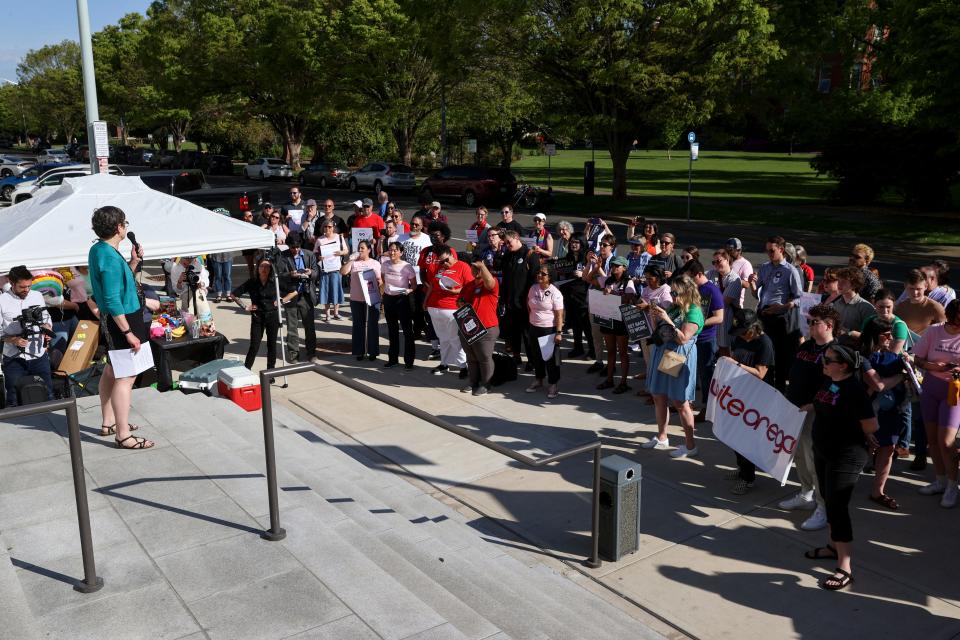Lawmakers near absence limit as walkout over Oregon reproductive, gender-affirming care bill drags on

- Oops!Something went wrong.Please try again later.
- Oops!Something went wrong.Please try again later.
Oregon lawmakers intent on passing legislation that would protect and decrease gaps in access to reproductive and gender-affirming health care have been stymied, at least temporarily, by Republican senators who have walked out of the Legislature.
HB 2002 explicitly lists reproductive and gender-affirming health care that would require insurance coverage by any health benefit plan in the state of Oregon, including abortion, contraceptives, sexually transmitted infections screening, breastfeeding support, domestic violence counseling, electrolysis and facial surgery.
The bill also clarifies that Oregon minors under the age of 15 are able to receive abortions without parental consent or notification.
At least 13 states had trigger laws to ban abortion in the first and second trimesters following the U.S. Supreme Court overturning Roe v. Wade. And dozens of other states have worked toward restricting or banning abortion with legislation that would limit or completely block access to this type of care. Anti-LGBTQ legislation has followed a similar trend.
That's why the walkout feels different to Jackie Yerby, board co-chair to Portland-based nonprofit Basic Rights Oregon, which focuses on LGBTQ+ policy and advocacy.
Four senators have nine unexcused absences as of Thursday: Brian Boquist, I-rural Polk and Yamhill counties; Daniel Bonham, R-The Dalles; Cedric Hayden, R-Fall Creek, and Dennis Linthicum, R-Klamath Falls.
If leaders fail to reach an agreement by 10:30 a.m. Monday when the Senate is scheduled to reconvene, they could hit 10 unexcused absences, the trigger under Measure 113 that would bar them from running for reelection.

Oregon's walkout history
Oregon is one of the four states with a requirement of a two-thirds quorum to conduct business. In the Senate, 20 of its 30 members must be present to hold a session. Texas, Tennessee, and Indiana are the other three states with a similar rule. Due to that threshold, walkouts have become a powerful tool for minority lawmakers.
In Texas, Democrats walked out for 93 days in 2021 in a failed effort to stop a Republican-backed voting bill that added stricter rules to the state's elections.
There have been walkouts throughout the Oregon Legislature's history, including in 2001, when House Democrats walked out in protest of a Republican redistricting plan.
But the tactic has been used most recently and frequently by Senate Republicans. In 2019, Republican senators twice walked out in disagreement with the cap-and-trade bill and a school funding tax package. The cap-and-trade plan failed during the session while the education package was passed.
A revised version of the cap-and-trade bill was introduced in 2020, but Senate Republicans again walked out, dooming scores of other bills during the 35-day session.
Senate Republicans walked out again in 2021 to target COVID-19 restrictions.
Peter Courtney, the Senate president for more than 20 years, warned in 2019 that lawmakers needed "to find a way to make sure this doesn't happen again."
Courtney does not want to tell legislative leaders what to do about the ongoing walkout nor does he have a "profound formula," but he said he is hopeful cooler heads prevail, perhaps thanks to Mother's Day weekend.
Courtney, no stranger to walkouts, said these situations are wearing and that each negotiation is unique.
But the clock is ticking, with the legislative session set to end on June 25.
"When you are in these situations, you've gotta go into a room and never come out until you've got a deal … I don't care how many hours it takes," Courtney said. "The Legislature's taken a lot of hits the last several years and a lot of hits as an institution and I think it hurts it."
Legislative discussions to lower the quorum requirement have yet to come to fruition but a ballot measure, approved last November, was meant to discourage walkouts. Under Measure 113, any legislator who accumulates 10 unexcused absences during a legislative session would be unable to serve for the term following the end of their current term.
"Denying quorum is one tool out of many that they have deployed to delay or stop bad bills this session; none have prevailed, meaning this walkout is the last resort and may result in losing their seats," Boquist wrote in a newsletter on Thursday.
Republican senators have appeared largely unconcerned about the repercussions of their unexcused absences. Senate Minority Leader Tim Knopp, R-Bend, has suggested senators are willing to reach 10 absences to challenge the constitutionality of the measure. He would not say which senator is willing to be the first to hit 10 in order to file a lawsuit.
For Sen. Bill Hansell, R-Athena, the prohibition on reelection doesn't matter much after announcing his retirement in March.
What are Republicans protesting?
Republicans insist the latest walkout was motivated by the readability of bills, not policy. It is an argument Democratic leaders immediately pushed back on.
Senators are set to take votes on two contentious bills and a proposed measure: House Bill 2002, 2005 and Senate Joint Resolution 33.
Sponsors have said House Bill 2005 would introduce "common sense" gun legislation, raising the age to purchase and possess certain guns, prohibiting unserialized "ghost guns" and allowing local governments to introduce restrictions on concealed firearms in public buildings.
SJR33 is a proposed constitutional amendment to enshrine the right to abortion, same-sex marriage, and gender-affirming care into the Oregon Constitution. It was introduced by Senate Majority Leader Kate Liber, D-Beaverton. Knopp has called the resolution an "extreme assault on parental rights."
But Knopp said Senate Republicans walked out to take issue with bills' compliance with little-used rules and statutes: Senate Rule 13.02 (5), ORS 171.134, and Article IV Section 21 of the Oregon Constitution. Under the rules and statutes, bill summaries must be written to reach a score of at least 60 on the Flesch readability test − essentially requiring them to be written in plain language that most adults could understand.
Knopp also has told reporters there were at least 20 "hyperpartisan" bills Republicans are protesting. He has declined to specify those bills.
Boquist, who has participated in all nine days of the walkout, wrote in his newsletter the walkout targets "specific pillars of wrongdoing" including HB2002, "lawlessness" and "corruption."
In walking out, "minority legislators are bravely 'doing their jobs' because they work for Oregonians, not the legislature," he wrote.
Quorum rules protect the minority from the rule of the majority, Boquist added.
Conversations ongoing to end walkout
Senate President Rob Wagner, D-Beaverton, told reporters his door has remained open to the Republican caucus to reach an agreement. All solutions except for killing HB2002 are on the table, he said.
“Let me be clear: House Bill 2002 is not up for negotiation,” Wagner said.
Lieber added that she has asked Republicans to give a "wish list" not a "kill list."
Wagner on Thursday agreed to pause floor sessions that had been scheduled through the weekend. Knopp issued a statement saying he made the request.
Instead, leadership plans to continue negotiations. Wagner, Knopp, Lieber, House Speaker Dan Rayfield, D-Corvallis, House Majority Leader Julie Fahey, D-Eugene, and House Minority Leader Vikki Breese-Iverson, R-Prineville, have met at least once.
“I hope this agreement to pause Senate floor sessions will create room for progress," Wagner said. "I will continue to engage in good faith conversations to move our state forward."
'Critically important legislation' at risk
As legislative leaders attempted to cool down talk of the walkout, public advocates made their frustration clear during a rally Thursday afternoon.
Hibah Hammas, a senior at the University of Oregon involved in politics and lobbying and part of the Oregon Student Association, spoke at the gathering. She joined other college students to advocate for more higher education resources not less, as the proposed public university and community college budget for the next biennium suggests.

Hammas and other students have shown up to meet with legislators while juggling schoolwork, jobs and extracurriculars. Millions of dollars hang in the balance, she said, and the Republican walkout doesn't send a positive message to students.
"Senators won't show up and are playing games with our future," Hammas added.
Sen. Elizabeth Steiner, D-Portland, said her Democratic colleagues have shown up every day to pass "critically important legislation," specifically HB2002, to protect abortion rights following Roe v. Wade being overturned.
Steiner, a physician, spoke of the fear patients and doctors have in states where "politicians are inserting themselves into these deeply personal medical decisions."
Dianne Lugo covers the Oregon Legislature and equity issues. Reach her at dlugo@statesmanjournal.com or on Twitter @DianneLugo
This article originally appeared on Salem Statesman Journal: As Oregon walkout drags on, GOP lawmakers near absence limit

